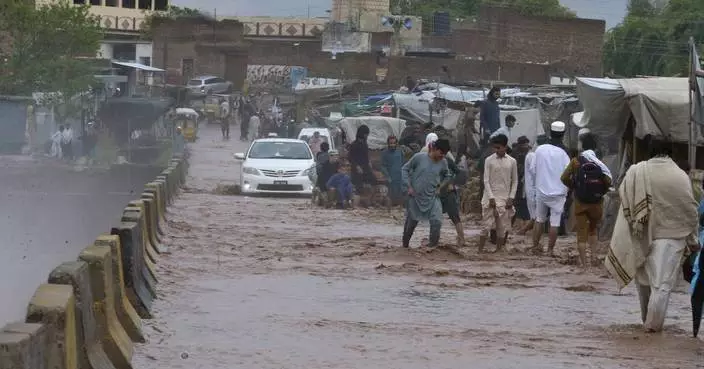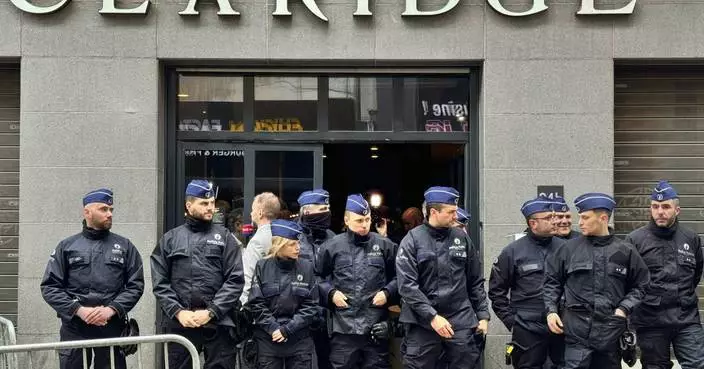A Russian artist has put a spotlight on what he calls "the ruins of a Soviet mythology" with a new exhibit that focuses on the chemical industry in his hometown.
The exhibit at Moscow's Museum of Modern Art features Pavel Otdelnov's architecturally precise paintings of decayed factories in the city of Dzerzhinsk interspersed with objects from factory workers' daily lives.
Click to Gallery
In this handout photo taken on Wednesday, Dec. 19, 2018, Pavel Otdelnov's work «Boom Barrier» is on display at an exhibition in Moscow, Russia. Pavel Otdelnov, a Russian artist who grew up in Dzerzhinsk, the center of the nation's chemical industries 355 kilometers (220 miles) east of Moscow, focused on the city, one of the most polluted in Russia, in his new 'Promzona' art show. (Pavel Otdelnov, Photo via AP)
In this handout photo taken on Thursday, Dec. 15, 2016, Pavel Otdelnov's work «Ruins #6» is on display at an exhibition in Moscow, Russia . Pavel Otdelnov, a Russian artist who grew up in Dzerzhinsk, the center of the nation's chemical industries 355 kilometers (220 miles) east of Moscow, focused on the city, one of the most polluted in Russia, in his new 'Promzona' art show. (Pavel Otdelnov, Photo via AP)
In this photo taken on Sunday, Feb. 17, 2019, visitors attend an exhibition by Russian artist Pavel Otdelnov, in Moscow, Russia . Pavel Otdelnov, a Russian artist who grew up in Dzerzhinsk, the center of the nation's chemical industries 355 kilometers (220 miles) east of Moscow, focused on the city, one of the most polluted in Russia, in his new 'Promzona' art show. (AP PhotoIvan Kochkarev)
In this photo taken on Sunday, Feb. 17, 2019, Pavel Otdelnov, a Russian artist poses for a photo in front of his work "Ruins #4" at his an exhibition in Moscow, Russia . Pavel Otdelnov, a Russian artist who grew up in Dzerzhinsk, the center of the nation's chemical industries 355 kilometers (220 miles) east of Moscow, focused on the city, one of the most polluted in Russia, in his new 'Promzona' art show. (AP PhotoIvan Kochkarev)
A Russian artist has put a spotlight on what he calls "the ruins of a Soviet mythology" with a new exhibit that focuses on the chemical industry in his hometown.
Many plants that were part of the military industrial complex didn't survive the collapse of the Soviet Union, but their toxic waste remains buried in underground dumps or seeping from landfills.
In this handout photo taken on Wednesday, Dec. 19, 2018, Pavel Otdelnov's work «Boom Barrier» is on display at an exhibition in Moscow, Russia. Pavel Otdelnov, a Russian artist who grew up in Dzerzhinsk, the center of the nation's chemical industries 355 kilometers (220 miles) east of Moscow, focused on the city, one of the most polluted in Russia, in his new 'Promzona' art show. (Pavel Otdelnov, Photo via AP)
In this photo taken on Sunday, Feb. 17, 2019, visitors attend an exhibition by Russian artist Pavel Otdelnov in Moscow, Russia . Pavel Otdelnov, a Russian artist who grew up in Dzerzhinsk, the center of the nation's chemical industries 355 kilometers (220 miles) east of Moscow, focused on the city, one of the most polluted in Russia, in his new 'Promzona' art show. (AP PhotoIvan Kochkarev)
In this handout photo taken on Thursday, Dec. 15, 2016, Pavel Otdelnov's work «Ruins #6» is on display at an exhibition in Moscow, Russia . Pavel Otdelnov, a Russian artist who grew up in Dzerzhinsk, the center of the nation's chemical industries 355 kilometers (220 miles) east of Moscow, focused on the city, one of the most polluted in Russia, in his new 'Promzona' art show. (Pavel Otdelnov, Photo via AP)
In this photo taken in 2018 and provided by Pavel Otdelnov, A view of an abandoned industrial building of the factory "Zarya" in Dzerzhinsk, is on display at an exhibition in Moscow, Russia. Pavel Otdelnov, a Russian artist who grew up in Dzerzhinsk, the center of the nation's chemical industries 355 kilometers (220 miles) east of Moscow, focused on the city, one of the most polluted in Russia, in his new 'Promzona' art show. (Pavel Otdelnov, Photo via AP)
In this photo taken on Sunday, Feb. 17, 2019, visitors attend an exhibition by Russian artist Pavel Otdelnov, in Moscow, Russia . Pavel Otdelnov, a Russian artist who grew up in Dzerzhinsk, the center of the nation's chemical industries 355 kilometers (220 miles) east of Moscow, focused on the city, one of the most polluted in Russia, in his new 'Promzona' art show. (AP PhotoIvan Kochkarev)
In this photo taken on Sunday, Feb. 17, 2019, Pavel Otdelnov, a Russian artist poses for a photo in front of his work "Ruins #4" at his an exhibition in Moscow, Russia . Pavel Otdelnov, a Russian artist who grew up in Dzerzhinsk, the center of the nation's chemical industries 355 kilometers (220 miles) east of Moscow, focused on the city, one of the most polluted in Russia, in his new 'Promzona' art show. (AP PhotoIvan Kochkarev)
In this photo taken on Sunday, Feb. 17, 2019, visitors attend an exhibition by Russian artist Pavel Otdelnov in Moscow, Russia . Pavel Otdelnov, a Russian artist who grew up in Dzerzhinsk, the center of the nation's chemical industries 355 kilometers (220 miles) east of Moscow, focused on the city, one of the most polluted in Russia, in his new 'Promzona' art show. (AP PhotoIvan Kochkarev)
In this photo taken on Sunday, Feb. 17, 2019, visitors attend an exhibition by Russian artist Pavel Otdelnov in Moscow, Russia. Pavel Otdelnov, a Russian artist who grew up in Dzerzhinsk, the center of the nation's chemical industries 355 kilometers (220 miles) east of Moscow, focused on the city, one of the most polluted in Russia, in his new 'Promzona' art show. (AP PhotoIvan Kochkarev)
Otdelnov was born into a "labor dynasty" that gave the city, the center of Soviet chemical manufacturing, several generations of chemical workers. His mother boiled his parents' bedding daily because his father's skin absorbed chemicals and yellowed the sheets.
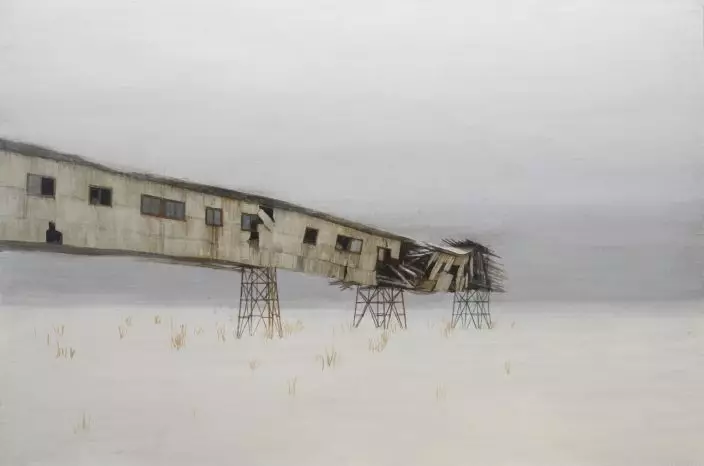
In this handout photo taken on Monday, Feb. 13, 2017, Pavel Otdelnov's work «Passage» is on display at an exhibition in Moscow, Russia . Pavel Otdelnov, a Russian artist who grew up in Dzerzhinsk, the center of the nation's chemical industries 355 kilometers (220 miles) east of Moscow, focused on the city, one of the most polluted in Russia, in his new 'Promzona' art show. (Pavel Otdelnov, Photo via AP)
Many plants that were part of the military industrial complex didn't survive the collapse of the Soviet Union, but their toxic waste remains buried in underground dumps or seeping from landfills.
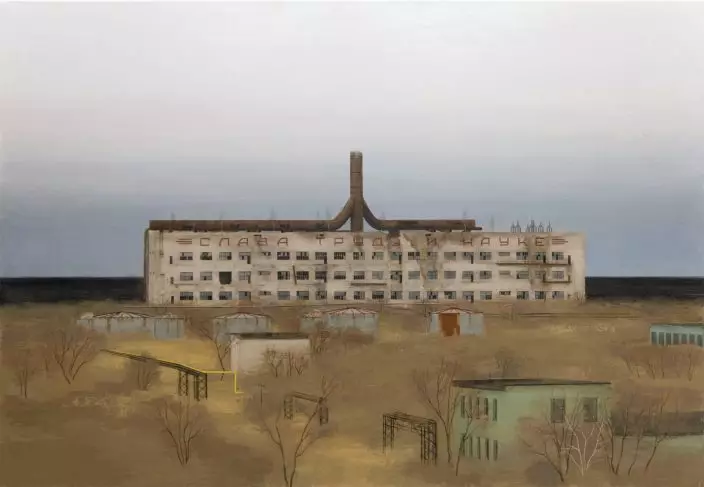
In this handout photo taken on Thursday, March 10, 2016, Pavel Otdelnov's work «Ruins. Glory to Labor» is on display at an exhibition in Moscow, Russia . Pavel Otdelnov, a Russian artist who grew up in Dzerzhinsk, the center of the nation's chemical industries 355 kilometers (220 miles) east of Moscow, focused on the city, one of the most polluted in Russia, in his new 'Promzona' art show. (Pavel Otdelnov, Photo via AP)
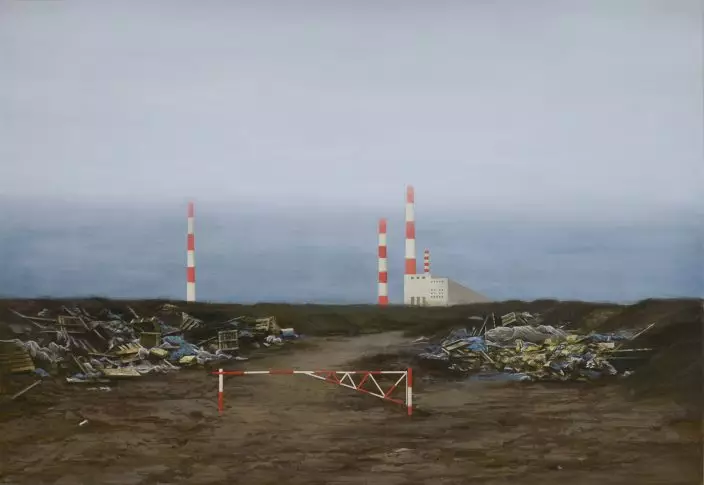
In this handout photo taken on Wednesday, Dec. 19, 2018, Pavel Otdelnov's work «Boom Barrier» is on display at an exhibition in Moscow, Russia. Pavel Otdelnov, a Russian artist who grew up in Dzerzhinsk, the center of the nation's chemical industries 355 kilometers (220 miles) east of Moscow, focused on the city, one of the most polluted in Russia, in his new 'Promzona' art show. (Pavel Otdelnov, Photo via AP)
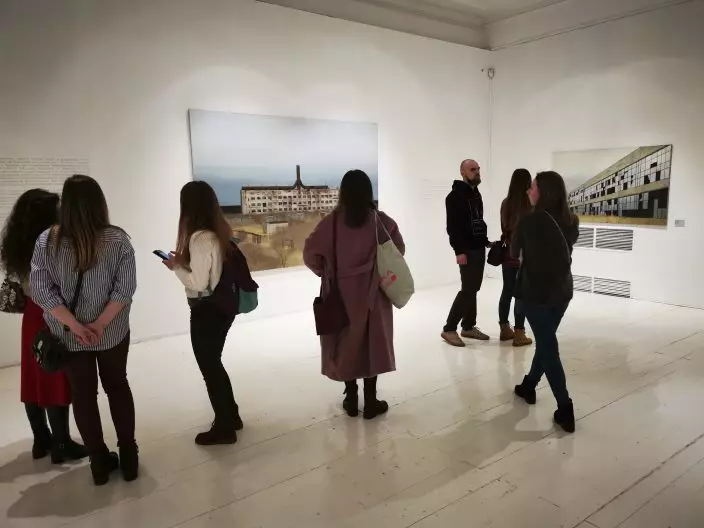
In this photo taken on Sunday, Feb. 17, 2019, visitors attend an exhibition by Russian artist Pavel Otdelnov in Moscow, Russia . Pavel Otdelnov, a Russian artist who grew up in Dzerzhinsk, the center of the nation's chemical industries 355 kilometers (220 miles) east of Moscow, focused on the city, one of the most polluted in Russia, in his new 'Promzona' art show. (AP PhotoIvan Kochkarev)
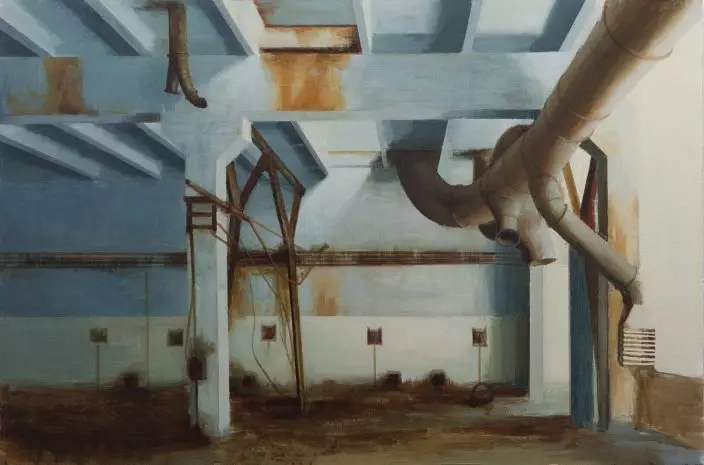
In this handout photo taken on Thursday, Dec. 15, 2016, Pavel Otdelnov's work «Ruins #6» is on display at an exhibition in Moscow, Russia . Pavel Otdelnov, a Russian artist who grew up in Dzerzhinsk, the center of the nation's chemical industries 355 kilometers (220 miles) east of Moscow, focused on the city, one of the most polluted in Russia, in his new 'Promzona' art show. (Pavel Otdelnov, Photo via AP)
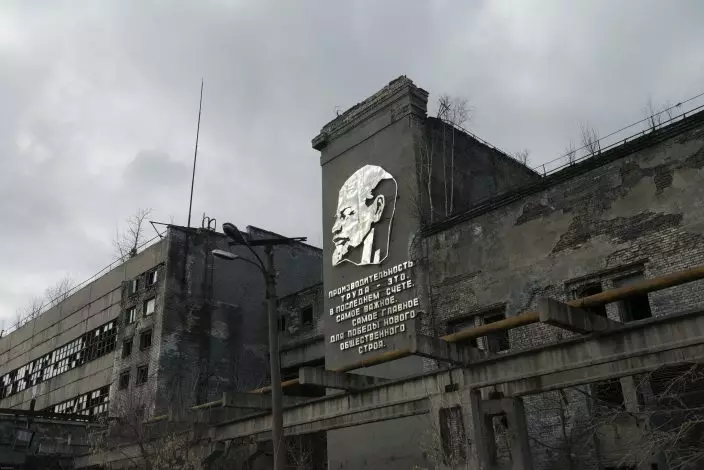
In this photo taken in 2018 and provided by Pavel Otdelnov, A view of an abandoned industrial building of the factory "Zarya" in Dzerzhinsk, is on display at an exhibition in Moscow, Russia. Pavel Otdelnov, a Russian artist who grew up in Dzerzhinsk, the center of the nation's chemical industries 355 kilometers (220 miles) east of Moscow, focused on the city, one of the most polluted in Russia, in his new 'Promzona' art show. (Pavel Otdelnov, Photo via AP)
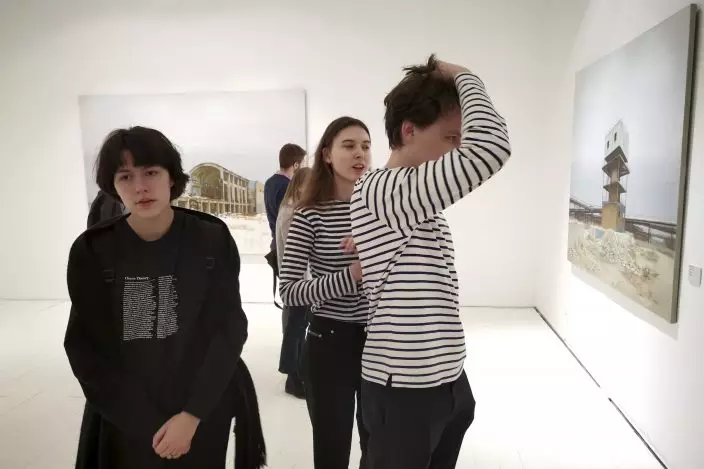
In this photo taken on Sunday, Feb. 17, 2019, visitors attend an exhibition by Russian artist Pavel Otdelnov, in Moscow, Russia . Pavel Otdelnov, a Russian artist who grew up in Dzerzhinsk, the center of the nation's chemical industries 355 kilometers (220 miles) east of Moscow, focused on the city, one of the most polluted in Russia, in his new 'Promzona' art show. (AP PhotoIvan Kochkarev)
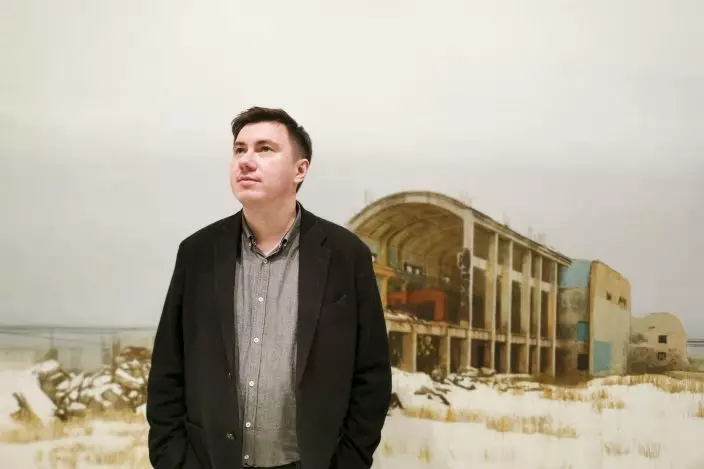
In this photo taken on Sunday, Feb. 17, 2019, Pavel Otdelnov, a Russian artist poses for a photo in front of his work "Ruins #4" at his an exhibition in Moscow, Russia . Pavel Otdelnov, a Russian artist who grew up in Dzerzhinsk, the center of the nation's chemical industries 355 kilometers (220 miles) east of Moscow, focused on the city, one of the most polluted in Russia, in his new 'Promzona' art show. (AP PhotoIvan Kochkarev)
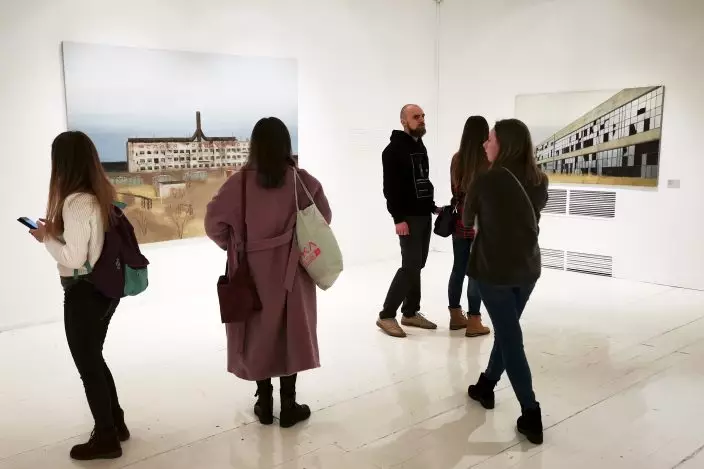
In this photo taken on Sunday, Feb. 17, 2019, visitors attend an exhibition by Russian artist Pavel Otdelnov in Moscow, Russia . Pavel Otdelnov, a Russian artist who grew up in Dzerzhinsk, the center of the nation's chemical industries 355 kilometers (220 miles) east of Moscow, focused on the city, one of the most polluted in Russia, in his new 'Promzona' art show. (AP PhotoIvan Kochkarev)
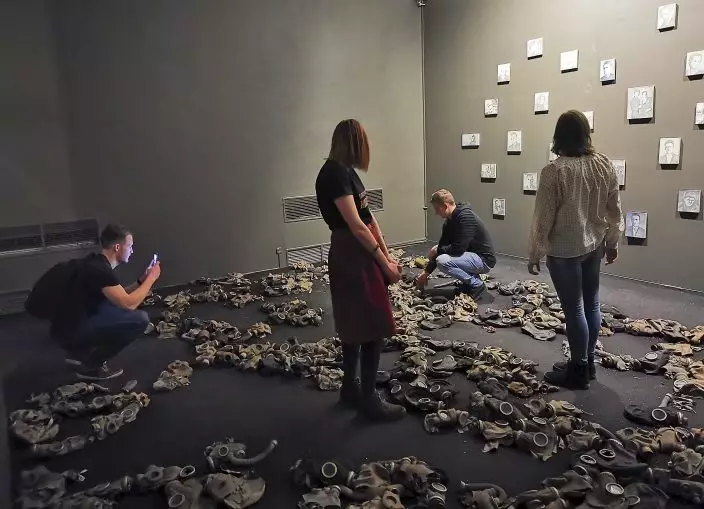
In this photo taken on Sunday, Feb. 17, 2019, visitors attend an exhibition by Russian artist Pavel Otdelnov in Moscow, Russia. Pavel Otdelnov, a Russian artist who grew up in Dzerzhinsk, the center of the nation's chemical industries 355 kilometers (220 miles) east of Moscow, focused on the city, one of the most polluted in Russia, in his new 'Promzona' art show. (AP PhotoIvan Kochkarev)
WARSAW, Poland (AP) — Polish Prime Minister Donald Tusk expressed satisfaction on Monday after a series of candidates supported by his party won weekend races for mayor.
Candidates from his pro-European Union centrist Civic Coalition, or running with the party's backing, won in a series of cities in the second round of local elections held on Sunday, among them Krakow, Poznan, Wroclaw and Rzeszow.
“It is very difficult to clearly say who won and who lost,” Tusk said Monday. “But if we compare these results, especially in the most attractive places, on these attractive battlefields ... then I actually have reasons for satisfaction.”
“Law and Justice has simply disappeared in many places,” Tusk added at a news conference, referring to the main opposition party.
The results put Civic Coalition in a favorable position as the country looks next to elections to the European Parliament on June 9.
Mayors were chosen in a total of 748 cities and towns where no single candidate won at least 50% of the vote during the first round on April 7.
Candidates for Tusk’s party also recaptured cities where they had not held power for many years, including Zielona Gora, Legnica and Torun.
The local and regional elections were viewed as a test for Tusk's pro-European Union government four months after it took power at the national level. Sunday's second round strengthened the Tusk government's leverage in the cities, which should facilitate cooperation on development projects and allotment of EU funds.
Tusk's allies also won in some places in the first round two weeks ago, including in Warsaw, where incumbent Mayor Rafal Trzaskowski was an easy victor.
In the first round, the right-wing Law and Justice, prevailed on the level of regional assemblies in the country's 16 provinces, where it took 34.3% of the votes, while Tusk's Civic Coalition got 30.6%. Law and Justice governed on the national level from 2015-23.
Tusk’s socially liberal Civic Coalition traditionally has strong support in cities, while Law and Justice has a more solid base in conservative rural areas, particularly in eastern Poland.
Civic Coalition is the largest group in a three-party coalition that governs the EU nation of 38 million people. The coalition is pro-European Union but otherwise spans a wide ideological spectrum with left-wing politicians in the Left party as well as conservatives in the Third Way.
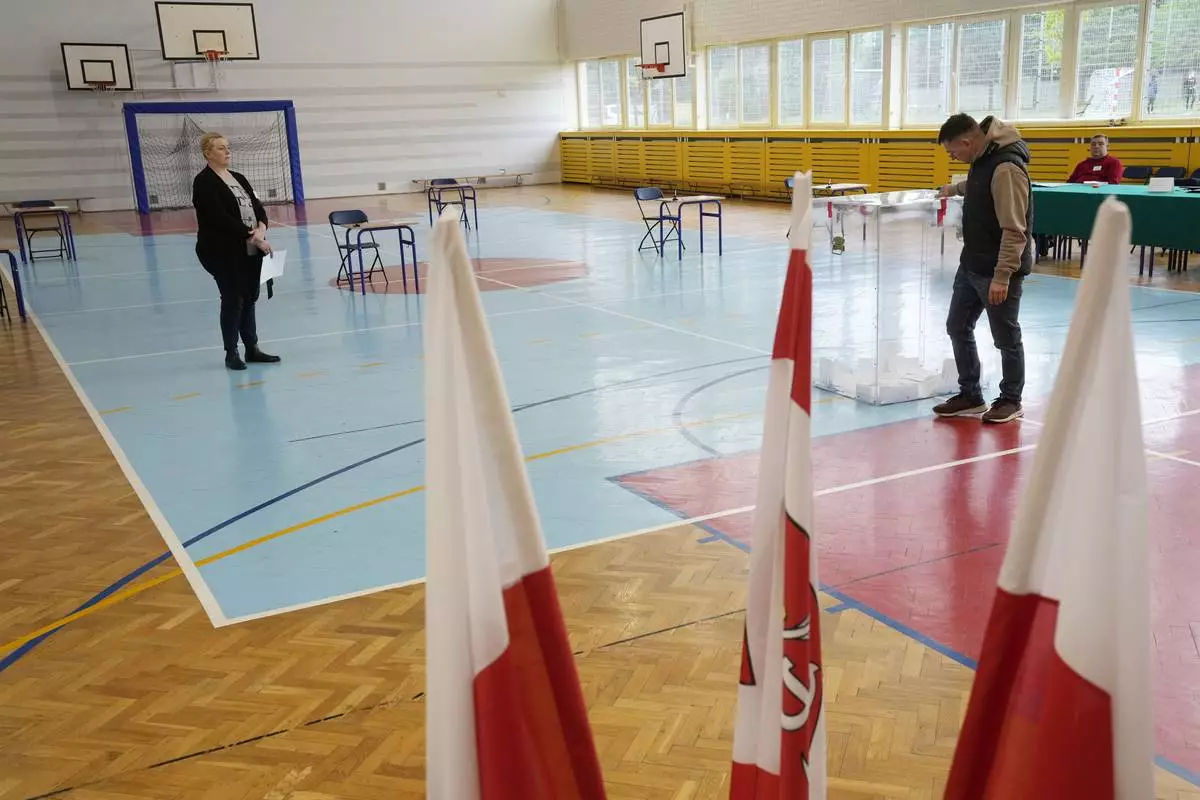
Polish voters take part in a local runoff election in Lomianki, near Warsaw, Poland on Sunday, April 21, 2024. Voters are choosing mayors who did not win outright in the first round of the election two weeks earlier. (AP Photo/Czarek Sokolowski)
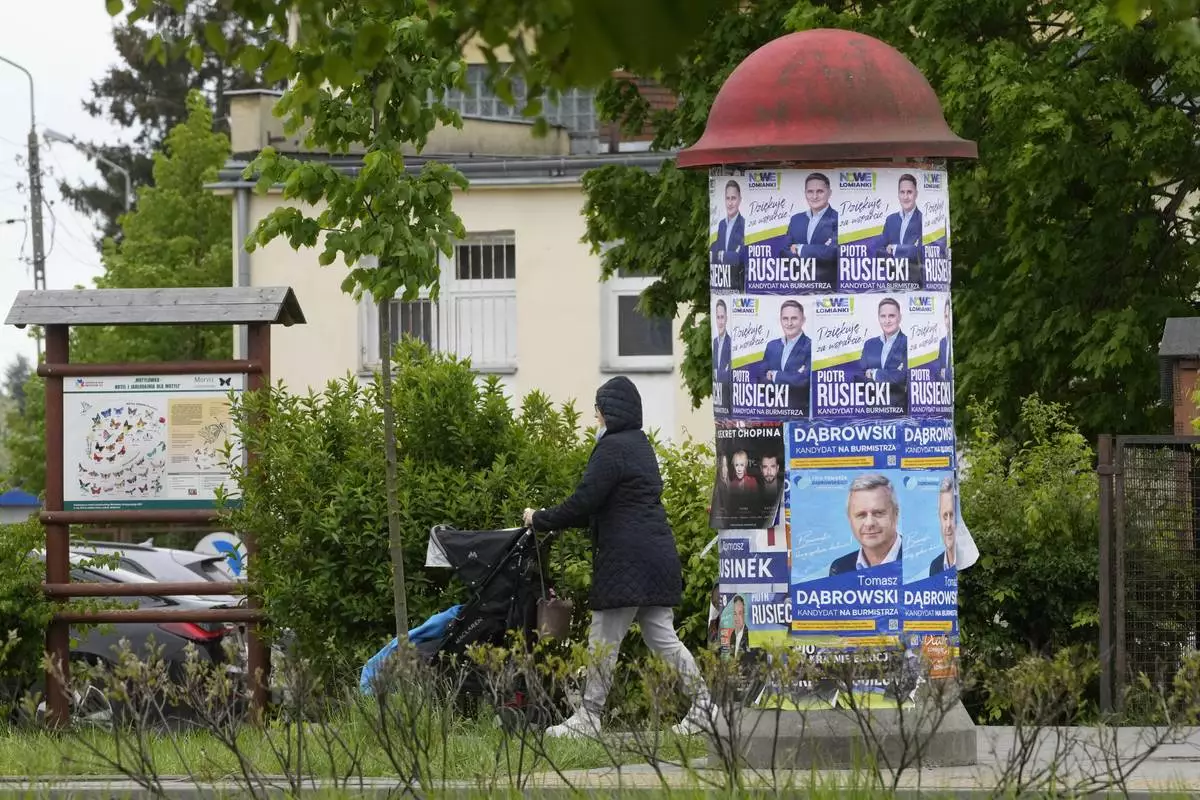
Campaign posters promote candidates as Poles vote in local and regional elections in Lomianki, near Warsaw, Poland on Sunday, April 21, 2024. Voters are choosing mayors who did not win outright in the first round of the election two weeks earlier. (AP Photo/Czarek Sokolowski)
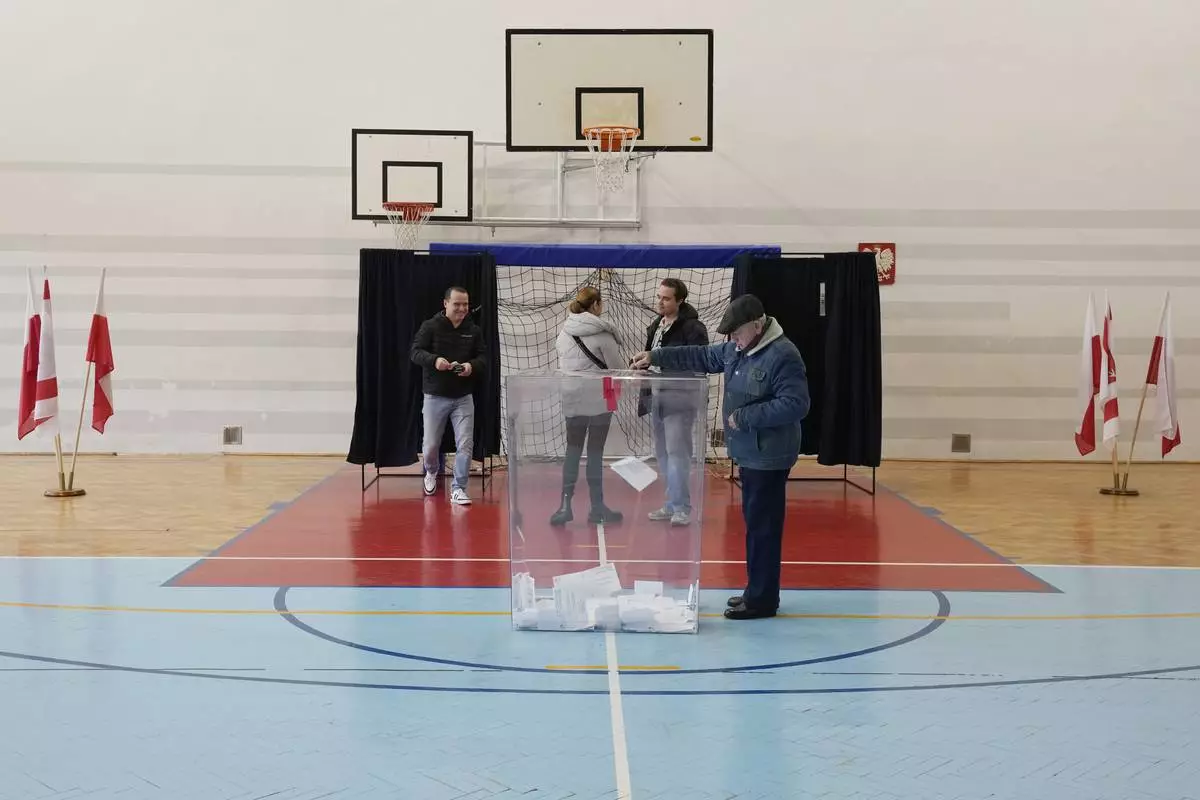
Polish voters take part in a local runoff election in Lomianki, near Warsaw, Poland on Sunday, April 21, 2024. Voters are choosing mayors who did not win outright in the first round of the election two weeks earlier. (AP Photo/Czarek Sokolowski)
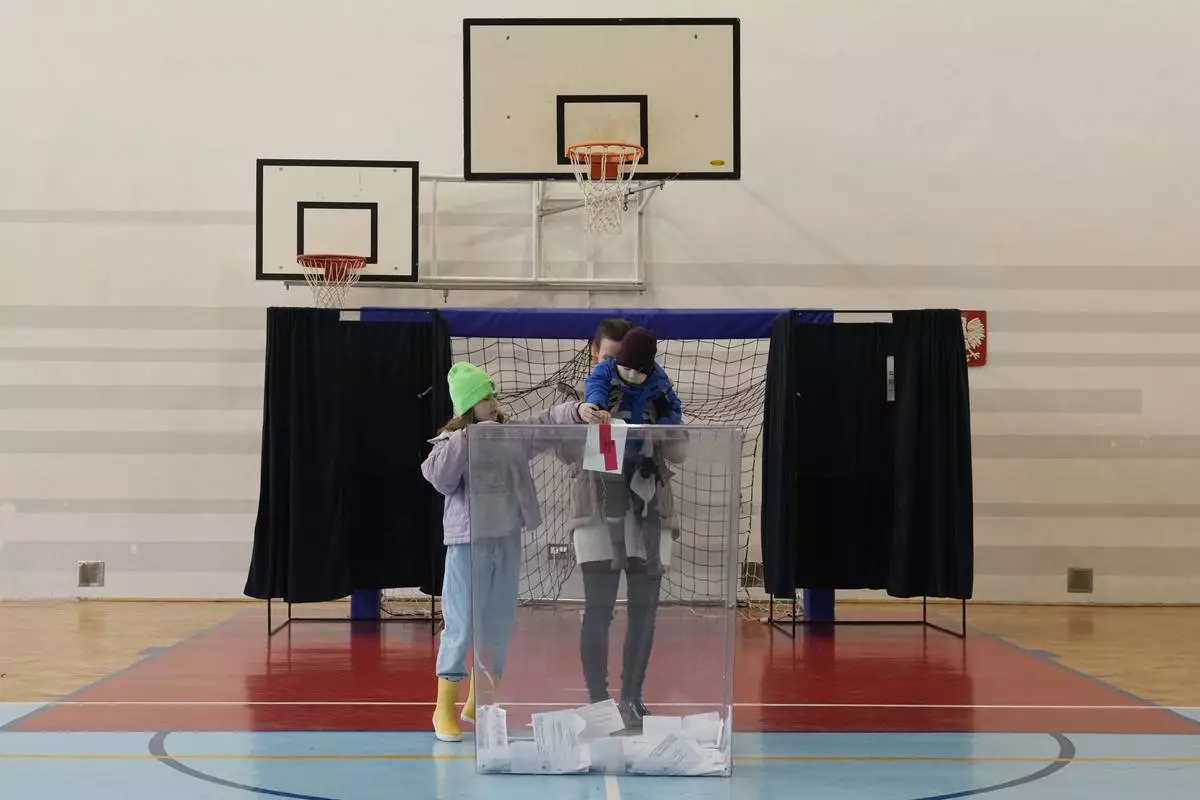
Polish voters take part in a local runoff election in Lomianki, near Warsaw, Poland on Sunday, April 21, 2024. Voters are choosing mayors who did not win outright in the first round of the election two weeks earlier. (AP Photo/Czarek Sokolowski)
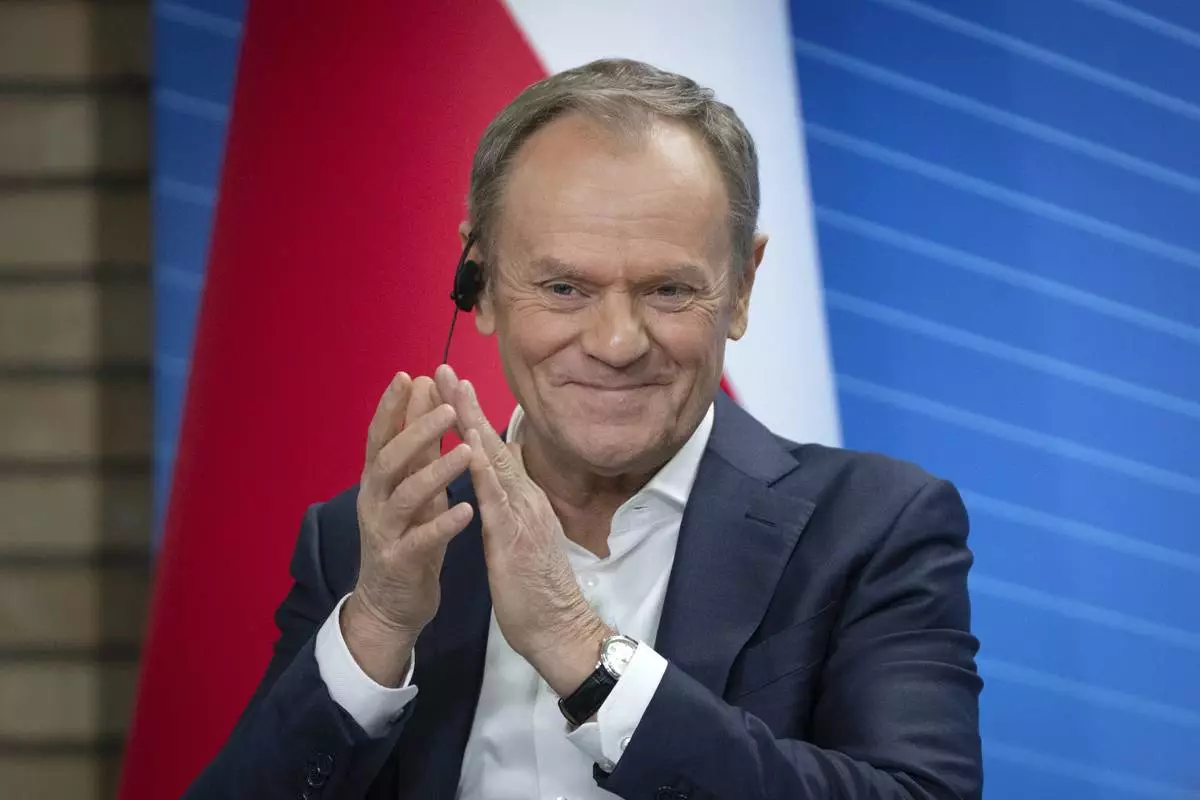
FILE - Poland's Prime Minister Donald Tusk reacts during his and Ukrainian President Volodymyr Zelenskyy meeting with students in Kyiv, Ukraine, Monday, Jan. 22, 2024. Poland's Prime Minister Donald Tusk is celebrating a victory on Monday April 22, 2024 after a series of candidates supported by his party won weekend races for mayor. (AP Photo/Efrem Lukatsky, File)
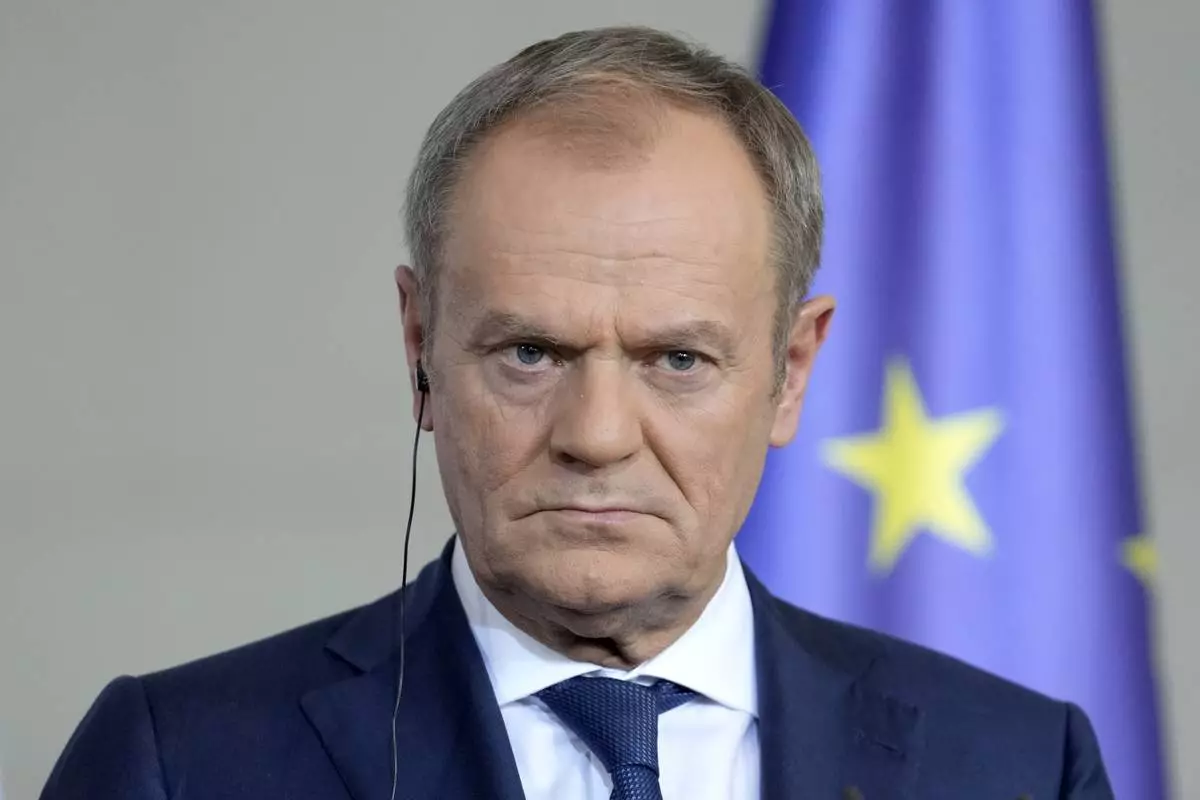
FILE - Poland's Prime Minister Donald Tusk listens to the media in Berlin, Germany, Friday, March 15, 2024. Tusk is celebrating a victory on Monday April 22, 2024 after a series of candidates supported by his party won weekend races for mayor. (AP Photo/Ebrahim Noroozi, File)
























